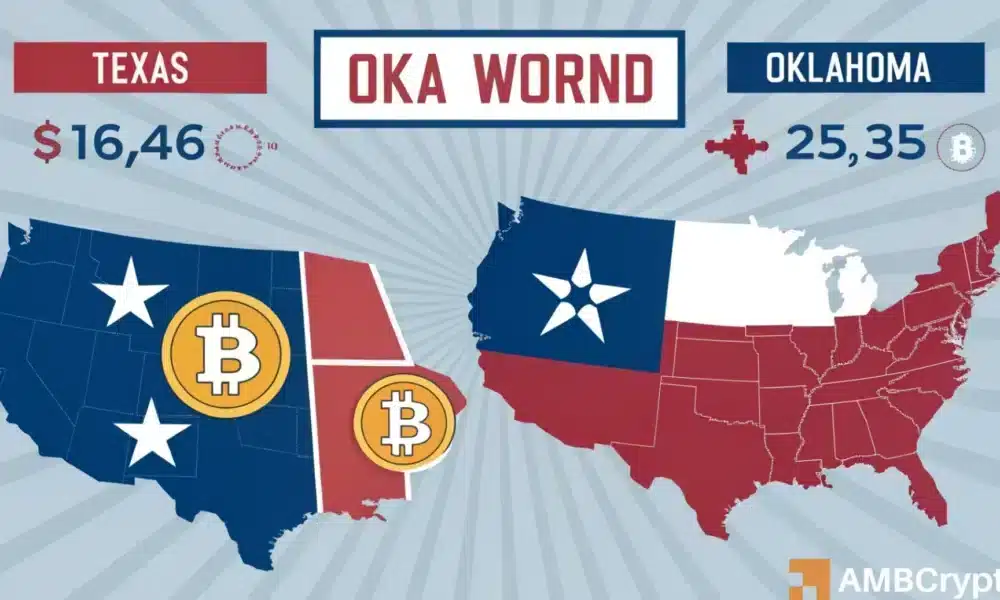- Texas and Oklahoma introduced bills to create Bitcoin reserves as strategic assets.
- Global interest grows in Bitcoin reserves, with countries like Switzerland and Russia exploring adoption.
As Donald Trump’s victory as the 47th U.S. president stirs up anticipation, discussions are intensifying about his pledge to establish a Bitcoin [BTC] Strategic Reserve.
Texas and Oklahoma introduce Bitcoin Reserve Bill
Recent efforts to position Bitcoin as a strategic reserve asset in the U.S. have gained momentum, especially with new bills being introduced in Texas and Oklahoma.
Texas Senator Charles Schwertner took to X (formerly Twitter) to comment on the matter, and stated,

Source: Charles Schwertner/X
For perspective, Texas offers a favorable environment for cryptocurrency activities, including mining operations. It provides tax exemptions for data centers and mining companies.
While cryptocurrency transactions are not taxed at the state level, they are subject to federal tax. Senator Schwertner stated that the proposal “would position our state at the forefront of the digital economy, driving growth and securing economic freedom for our great state.”
How it would work?
The bill proposes creating a fund outside Texas’ general revenue to hold BTC as an asset. It also aims to allocate funds to purchase more BTC for the reserve.
Additionally, the legislation allows residents to donate Bitcoin, promoting “shared ownership of and community investment in this state’s future.”
The bill proposes BTC be stored in cold storage with strict security measures and regular audits for transparency.
Interestingly, this is the second proposal for a Bitcoin Strategic Reserve in Texas within weeks. It follows Representative Giovanni Capriglione’s introduction of a similar plan in December 2024.
Besides Texas, Oklahoma joins the fray…
In parallel, Oklahoma’s state Representative Cody Maynard has introduced House Bill 1203, also known as the Strategic Bitcoin Reserve Act, further pushing the initiative forward.
The bill noted,
“Bitcoin represents freedom from bureaucrats printing away our purchasing power. As a decentralized form of money, Bitcoin cannot be manipulated or created by government entities. It is the ultimate store of value for those who believe in financial freedom and sound money principles,”
It further provides for “any state retirement fund” to hold digital assets in secure custody solutions, with the option of using a qualified custodian, and even permits investments through exchange-traded products (ETPs).
For those unfamiliar, Oklahoma has recently passed laws protecting Bitcoin rights, allowing employees to receive Bitcoin payments and vendors to accept Bitcoin.
The state also introduced the Strategic Bitcoin Reserve Act, allowing state funds to invest in Bitcoin, capped at 10% of fund values.
While cryptocurrency taxation remains unclear, the legislation signals a favorable stance towards crypto operations, including mining.
Other nations to follow U.S. footsteps
Notably, Texas has become a hub for crypto activities, offering tax exemptions for mining operations and attracting data centers with its favorable policies.
Meanwhile, Oklahoma has passed legislation promoting Bitcoin adoption, such as the Strategic Bitcoin Reserve Act, which permits state funds to invest in Bitcoin.
Internationally, Switzerland, Vancouver, Ohio, China, and Russia are exploring the integration of Bitcoin into their financial reserves, signaling a growing global trend.
However, with Polyamarket data indicating that only 36% believe Trump will establish a Bitcoin reserve in his first hundred days, the future of Bitcoin reserves in the U.S. remains uncertain.

